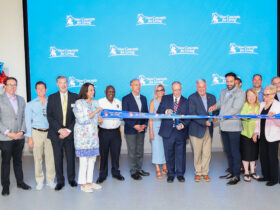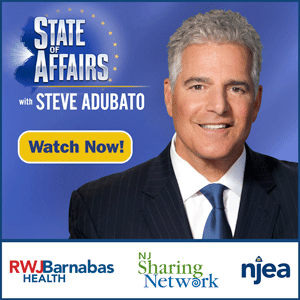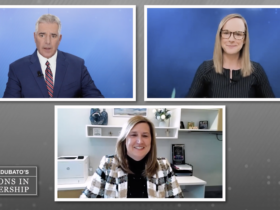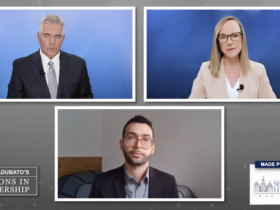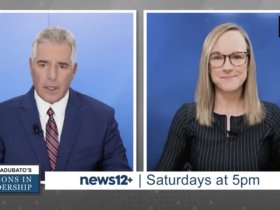 Like everyone else in the COVID-19 nightmare we are living, I am deeply concerned, feeling anxious and worried about my family and those closest to me and not sure how to manage and deal with this terrible pandemic and everything connected to it. I have been teaching, coaching, writing about and most of all thinking about leadership and communication for a solid two decades. I have written five books on these subjects – and I can fill another book with everything I either don’t know or am uncertain about in terms of how best to lead and communicate in really difficult, challenging and uncertain times. That’s why I wanted to write this column.
Like everyone else in the COVID-19 nightmare we are living, I am deeply concerned, feeling anxious and worried about my family and those closest to me and not sure how to manage and deal with this terrible pandemic and everything connected to it. I have been teaching, coaching, writing about and most of all thinking about leadership and communication for a solid two decades. I have written five books on these subjects – and I can fill another book with everything I either don’t know or am uncertain about in terms of how best to lead and communicate in really difficult, challenging and uncertain times. That’s why I wanted to write this column.
The one thing I have come to understand is that whether it is COVID-19 or any other “crisis” that shakes us to our core—one of the most important things we can do is be useful and helpful to others. It’s not that the greatest leaders aren’t scared. They are. It is that they don’t let that fear and anxiety paralyze them.
It seems to me that the most effective leaders are the ones who understand and acknowledge their anxiety and insecurities in the midst of a crisis like this – but also know that they have a larger responsibility to the people they serve. The best leaders in a serious crisis need to be a better version of themselves and reach deep inside to do the kinds of things that give others direction, a sense of hope and, most of all, create a level of trust—because that is at the core of leadership and how we communicate. With this in mind, consider the following:
- When communicating in any public forum, leaders must be truthful and candid. This is easier said than done, because many leaders, in the effort to give people “hope”, sugar coat how serious things really are or make statements that can’t be backed up by facts, science or reality. Giving false hope and communicating misinformation is one of the worst things any leader can do in a crisis or pandemic like we are currently facing.
- Be concise. Don’t drone on. Don’t pontificate. I like to say “stay within the goalposts” when communicating. That means, identify what key points and messages a leader needs to communicate and put them “inside the goalposts.” Everything outside that goalposts is dangerous and risky. So what is outside the goalposts? Blaming others. Pointing fingers. Name calling. Making statements you can’t back up. And, frankly, letting your emotions and fear get the best of you. The greatest leaders in a crisis are disciplined and practice self-control because when a leader communicates that he or she is “out of control,” what impact do you think it has on everyone else?
- The greatest leaders step aside and let others who are more knowledgeable in a particular subject area step up and speak out. The best leaders are not the ones who “talk the most” in a public forum or press conference. It seems to me NY Governor Andrew Cuomo and NJ Governor Phil Murphy get this part right. Yes, they are talking a lot, but they are also deferring and “handing the ball off” to other experts, particularly about public health, who can speak with authority and experience on a particular topic. After 9/11, it struck me that then NY City Mayor Rudy Giuliani also did this. Great leaders are “facilitators” in public settings, allowing others to fill in the blanks and respond to difficult and specific questions. They are not the people who are supposed to know the most about everything.
- The best leaders are also the ones who, when they do say something that is either incorrect or needs clarification, have the self-confidence and level of maturity to allow a subject area expert to correct or clarify something that is said in public—without any retribution or negative consequences.
- Leaders should never lose their cool. When asked a difficult or challenging question by a reporter or key stakeholder in a public forum, there is no excuse for a leader to attack the questioner. The best leaders understand that attacking the questioner as well as the question itself actually communicates a lack of confidence, because the leader clearly doesn’t want to and can’t answer the question. If the answer is “I don’t know” or “We should have handled that better” just say so. It doesn’t help anyone to express anger or personal animus toward someone simply asking a tough question. Leaders are supposed to respond with confidence, clarity and a sense of “I’ve got this as opposed to “How dare you ask me that question in public”, particularly when the question relates to the crisis at hand.
- Great leaders acknowledge and empathize with the pain and struggle people are experiencing in a public health crisis. Simply stating “here are the rules—obey them” won’t get things done. The best leaders understand that social distancing and “staying in your house” are unnatural, not easy and incredibly difficult for parents to explain, not just to themselves but to teenagers and children. I appreciate and respect leaders who acknowledge that and say so publicly. So, on one hand, leaders should communicate accurate facts, statistics and information as well as “the rules” we must abide by. But if that is all a leader does in public, why not just send a mass e-mail?
- The best leaders communicate in a human and compassionate fashion. In the case of the COVID-19, they get that beyond the numbers of those infected and, worse, those who have died – recognizing that those numbers represent real people and families.
I’m not saying that being a great leader and communicator in a horrific pandemic is easy, it’s not. Trust me, I struggle every day with it and I only run a small production company as well as teach, coach and write about these topics. However, I have been spending a lot of time reading about presidential leadership in war time in an effort to put things in perspective. And whether it is Lincoln, Roosevelt or LBJ, it is clear that they had their doubts and fears. But the greatest leaders have one common and consistent trait, which is that they manage and deal with these inner fears and demons because they understand that their greatest responsibility is to help others get through the most challenging of times.
As always, e-mail your feedback to SteveAdubato@gmail.com. On behalf of my colleague Mary Gamba and everyone on the Lessons in Leadership team: STAY SAFE. STAY HOME. BE WELL.






